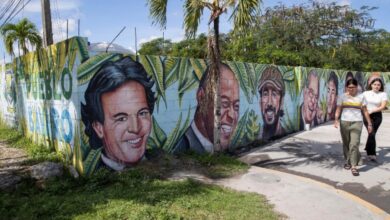Key Latin America Issues for the Next U.S. President to Address

Experts emphasize that the next U.S. administration must focus on sustainable economic growth, development opportunities, and countering authoritarianism to foster better relations with Latin America and address the region’s critical challenges.
With the 2024 U.S. presidential election on the horizon, the relationship between the United States and Latin America is at a critical crossroads. The decisions made by the next administration will significantly shape the future of U.S.-Latin America relations. Politicians and former high-ranking officials have weighed in on the essential issues that should shape U.S. foreign policy toward the region. These insights provide a roadmap for the next U.S. administration to strengthen ties with Latin America and address the region’s pressing challenges.
Building Sustainable Growth
Iván Duque, former president of Colombia and distinguished fellow at several prestigious institutions, emphasizes the importance of sustainable economic growth and reducing social gaps. He advocates for a bipartisan and bicameral approach to creating long-term policies that foster regional stability and prosperity.
Duque emphasizes the need for more trade and investment agreements and the acceleration of friend-sharing. He calls for strategic U.S. participation in infrastructure projects, particularly those involving the energy transition, 5G network deployment, and critical technologies such as A.I., cybersecurity, blockchain, and cloud computing. By leveraging the resources of U.S. agencies like USAID, the Development Finance Corporation (DFC), and the Export-Import Bank, Latin American countries can stimulate investment, accelerate growth, and expand the middle class, thus reducing the push factors for illegal migration.
Furthermore, Duque stresses the importance of intelligent security support to dismantle transnational organized crime groups. He views law enforcement as a public good that can help create a safer and more stable environment conducive to economic development.
This perspective resonates deeply in Latin America, where economic disparities and social inequalities remain significant challenges. The region’s countries are in dire need of sustainable growth models that not only boost economic performance but also ensure equitable distribution of wealth and opportunities.
Addressing Opportunity and Development
Isabel de Saint Malo de Alvarado, former vice president and foreign affairs minister of Panama, underscores the interconnectedness of irregular migration, drug trafficking, organized crime, and lack of security with the region’s socio-economic conditions. She points out that despite significant investment, these issues persist due to the underlying lack of opportunities and inadequate living conditions.
De Saint Malo de Alvarado argues that Latin Americans are not seeking handouts but pathways to improve their livelihoods and those of their families. This should be at the core of U.S. foreign policy towards the Americas. Addressing the root causes of these challenges involves tackling low productivity, low participation in value chains, limited investment in research and development, fiscal challenges, and high levels of informality in the economy.
The situation is dire in a region where over 170 million people lack sufficient income for their basic needs. Many have lost faith in the possibility of a better life, leading to pessimism and disenfranchisement. The following U.S. administration needs to recognize the critical link between development and democracy and between development and the fight against crime.
De Saint Malo de Alvarado calls for a comprehensive approach to combat inequality and exclusion in Latin America. This approach should not only foster opportunities and well-being but also apply increased pressure on countries under dictatorships like Cuba, Nicaragua, and Venezuela. She advocates for stronger sanctions to force a return to democratic values and respect for human rights. While challenging, this approach aims to bring about meaningful change for the oppressed populations in these nations.
Countering Authoritarianism
Samuel Pérez, an economist and member of Guatemala’s Congress, identifies the rise of radical authoritarian groups as the gravest challenge facing the region. These groups seek to capture public institutions and dismantle democracy, posing a profound regional threat. Pérez stresses the need for governments throughout the hemisphere, including the U.S., to strengthen democracies and cooperate to prevent the spread of authoritarianism.
These authoritarian movements exploit widespread frustration with deepening inequality and the perceived failure of democratic leaders to meet expectations of opportunity and improved material conditions. By sowing doubt about democracy’s effectiveness, they push for authoritarian alternatives.
Pérez advocates for using multilateralism and astute political action to ensure democracy delivers tangible results. This involves scaling up investment, achieving inclusive growth, and improving environmental conditions, particularly in light of the devastating effects of climate change. Such measures can address insecurity, reduce migration, and reinforce the belief in democracy as the right path forward.
In Latin America, where many countries have experienced authoritarian regimes, the importance of defending and strengthening democratic institutions cannot be overstated. The rise of authoritarianism threatens not only political stability but also the socio-economic progress of the region.
Conclusion: A Roadmap for the Future
As the 2024 U.S. presidential election approaches, the next administration has the potential to redefine its approach to Latin America. Insights from Duque, De Saint Malo de Alvarado, and Pérez offer a comprehensive roadmap for addressing the region’s most pressing issues, instilling hope for a brighter future.
Fostering sustainable economic growth, creating development opportunities, and countering authoritarianism are vital priorities that require the collective effort and collaboration of the U.S. and Latin America. The following U.S. administration can strengthen ties with Latin America by focusing on these areas and contribute to the region’s stability and prosperity. Only through unity and shared goals can we overcome the challenges that lie ahead, instilling a sense of collective responsibility in the audience.
The stakes are high for Latin America. Effectively addressing these challenges can pave the way for a more equitable and democratic future where opportunities for growth and development are accessible to all. The region’s historical struggles and recent advancements provide valuable lessons to guide the path forward.
Also read: U.S. Sanctions Venezuelan Gang Tren de Aragua in Major Crackdown
Ultimately, the relationship between the United States and Latin America is pivotal for both regions’ future. The following U.S. administration can be crucial in shaping a more prosperous and stable Latin America. The next administration can significantly contribute to the region’s stability and prosperity by embracing a strategic, holistic, and inclusive approach.
This article is adapted from Americas Quarterly special report on the 2024 U.S. presidential election and its impact on Latin America.





